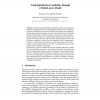Free Online Productivity Tools
i2Speak
i2Symbol
i2OCR
iTex2Img
iWeb2Print
iWeb2Shot
i2Type
iPdf2Split
iPdf2Merge
i2Bopomofo
i2Arabic
i2Style
i2Image
i2PDF
iLatex2Rtf
Sci2ools
120
click to vote
BPM
2008
Springer
2008
Springer
Analyzing Business Continuity through a Multi-layers Model
Business Continuity Management (BCM) is a process to manage risks, emergencies, and recovery plans of an organization during a crisis. It results in a document called Business Continuity Plans (BCP) that specifies the methodology and procedures required to backup and recover the functional unit of a disrupted business. Traditionally, the BCP assessment is based only on the continuity of IS infrastructures and does not consider possible relations with the business objectives and business processes. This traditional approach assumes that the risk of business continuity is resulted from the disruption of the IS infrastructures. However, we believe there are situations where the risk emerges even the infrastructures up and running. Moreover, the lack of modeling framework and the aided-tool make the process even harder. In this paper, we propose a framework to support modeling and analysis of BCP from the organization perspective, where risks and treatments are modeled and analyzed along s...
BPM 2008 | Business | Business Continuity | Business Continuity Management | Business Continuity Plans |
Related Content
| Added | 12 Oct 2010 |
| Updated | 12 Oct 2010 |
| Type | Conference |
| Year | 2008 |
| Where | BPM |
| Authors | Yudistira Asnar, Paolo Giorgini |
Comments (0)

